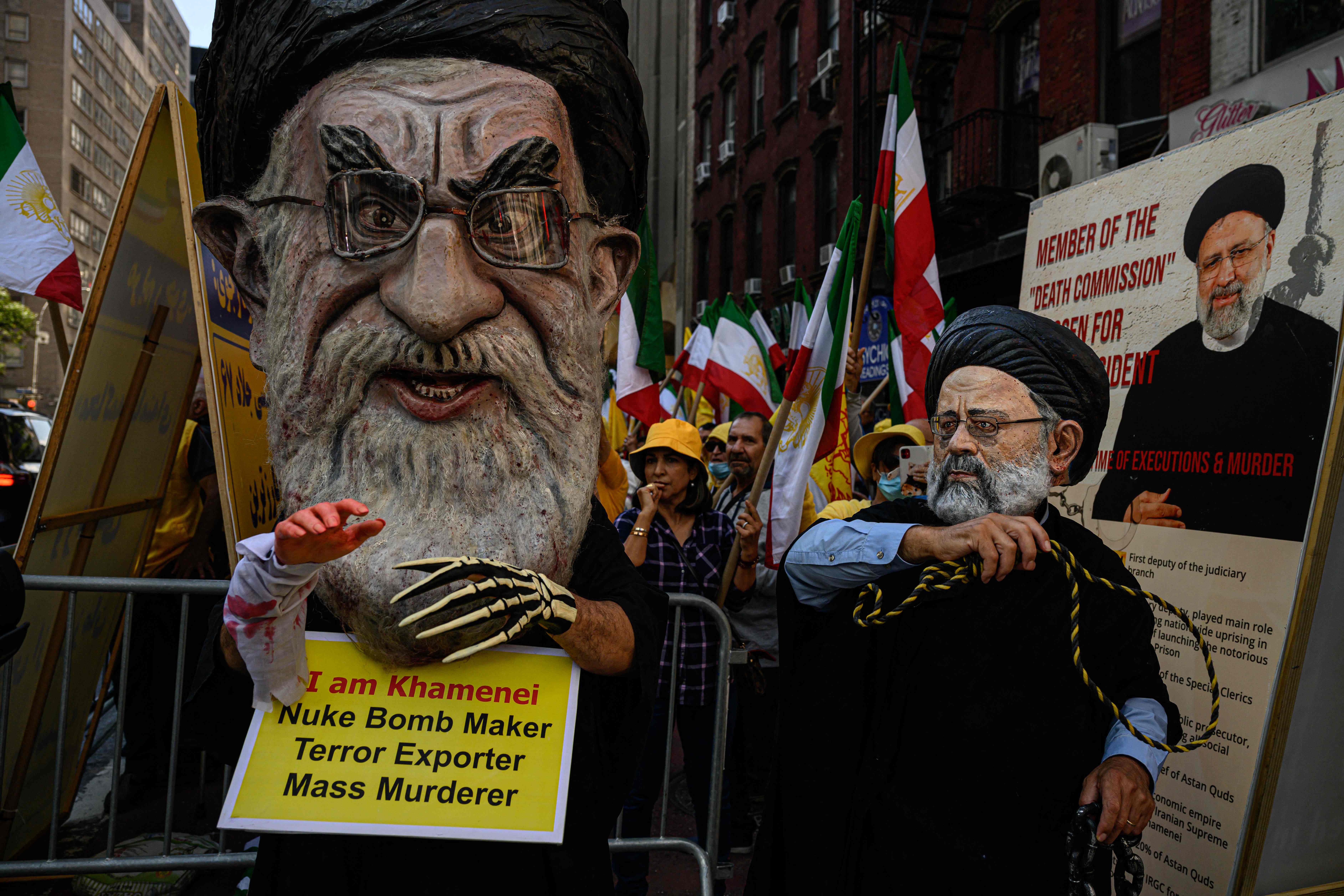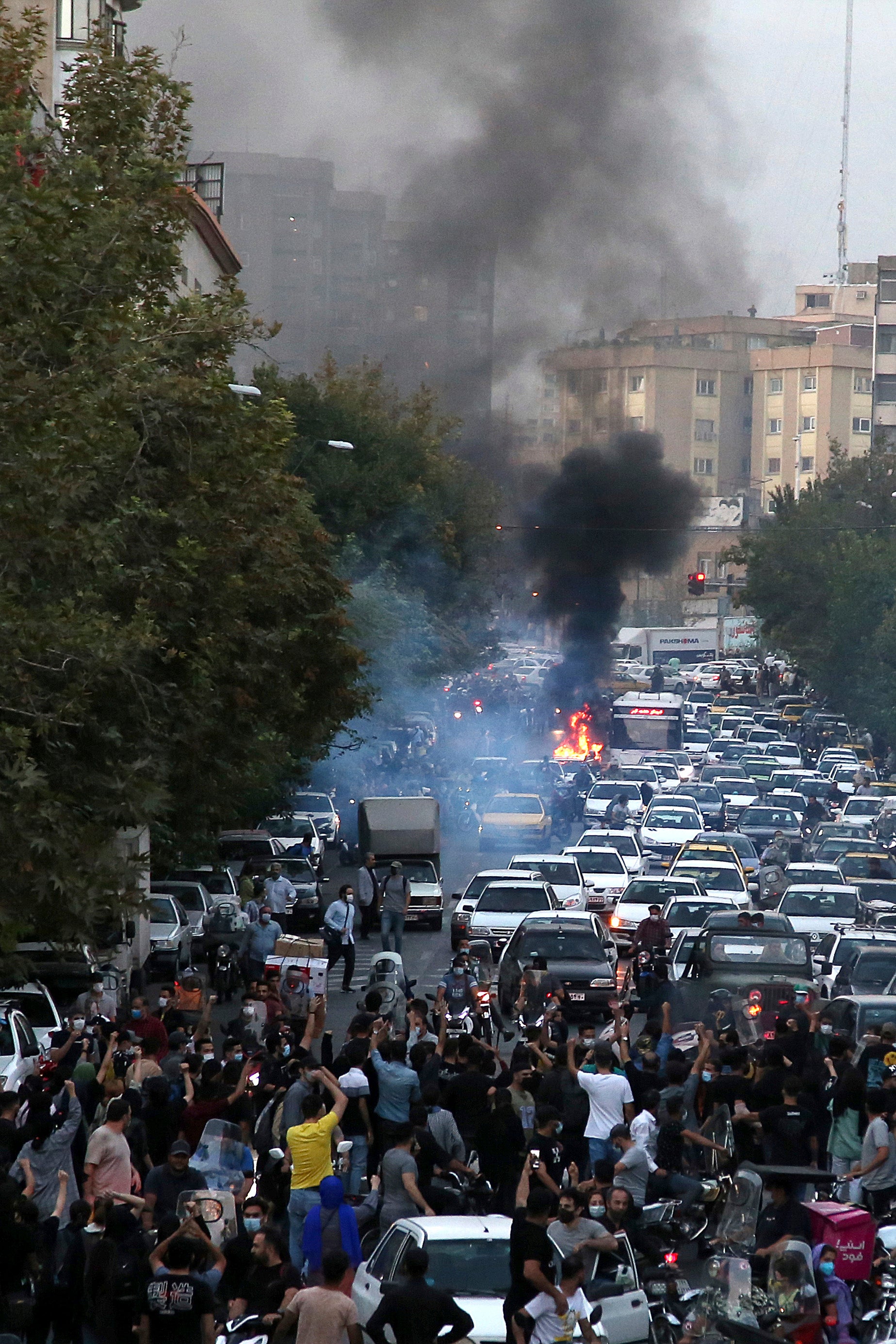As Iran’s Raisi rails about human rights at UN, his own shock troops pounce at home
‘Human rights belongs to all,’ says Raisi as protests get under way again in Iran

Your support helps us to tell the story
From reproductive rights to climate change to Big Tech, The Independent is on the ground when the story is developing. Whether it's investigating the financials of Elon Musk's pro-Trump PAC or producing our latest documentary, 'The A Word', which shines a light on the American women fighting for reproductive rights, we know how important it is to parse out the facts from the messaging.
At such a critical moment in US history, we need reporters on the ground. Your donation allows us to keep sending journalists to speak to both sides of the story.
The Independent is trusted by Americans across the entire political spectrum. And unlike many other quality news outlets, we choose not to lock Americans out of our reporting and analysis with paywalls. We believe quality journalism should be available to everyone, paid for by those who can afford it.
Your support makes all the difference.Iranian president Ebrahim Raisi yesterday railed against oppression, injustice and human rights violations by the West, even as his own shock troops simultaneously brutalised citizens back home.
Mr Raisi was in New York for the 77th gathering of the United Nations General Assembly. He addressed the assembly in a speech in which he condemned abuses by Canada against Indigenous people, by the United States against migrants and by Israel against Palestinians, but ignored his own regime’s violations.
“Human rights belong to all but are unfortunately trampled upon by other governments,” he said. “We believe any oppressive action is a threat to world peace and stability. America cannot stand that some countries are able to stand on their own two feet.”
In his speech, Mr Raisi recounted a long list of grievances against the West, dating from international pressure on Iran during the early 20th century up to the 2020 US assassination of Revolutionary Guard commander Qassem Soleimani, whose portrait he held up and waved before the General Assembly chamber.
He criticised the US for tearing up the 2015 nuclear deal that his hardline faction vocally opposed when it was negotiated by his predecessor, while accusing Western powers of bullying Iran.
“What we seek is the rights of the Iranian nation, the Iranian people,” he said. “A relationship based on oppression will not be tolerated. None of the successes of the Iranian nation have been acceptable to the world powers.”
Though Mr Raisi sought to boast about Iran’s achievements and international ties, much attention this week has been focused on the brutal crackdown back home on a widespread outbreak of popular protest sparked by the death of a young woman last week.
And even as Mr Raisi spoke, Iranians began warning that internet lines were being throttled and social media outlets such as Instagram blocked as a sixth consecutive day of protests since the death of 22-year-old Mahsa Amini got under way in dozens of cities and towns across the country.
Over the last few days, videos posted online showed plainclothes and uniformed Iranian regime enforcers beating women with truncheons, firing teargas rounds and possibly firing live rounds directly at crowds.
At least six people have been killed so far in chaotic street clashes provoked by security forces seeking to quell public anger over the death of Ms Amini, who fell into a coma while being held by the morality police in Tehran. Among those killed was a plainclothes regime adjutant in Shiraz.
But the latest protests, coinciding with the international spotlight on Iran in New York, appear to have complicated the authorities’ calculations. The regime has often refrained from using deadly force to quell protests by urban elites, while imposing the full weight of the security apparatus against ethnic minorities and marginalised communities on the periphery.
This week’s demonstrastions have drawn in multiple social segments, and sparked dissent even within the regime elite. In addition to a wide swathe across Iran’s Kurdish heartland, protests broke out in the capital, Tehran, as well as Mashhad, Isfahan, Shiraz, Tabriz, Urmia, Rasht, Kerman, Bandar Abbas, Qom, Ardabil, Kermanshah, Zanjan, Sari, Rafsanjan, Mazandaran, Gorgan, Qazvin, Semnan and other cities.
Iran watchers say that the killing of Ms Amini, seen as an ordinary young woman minding her own business, has touched a deep nerve among Iranians, and even conservative women who want to keep the hijab compulsory are upset.
The level of raw emotion has been compared to how Iranians felt after the 2020 downing of the Ukrainian Airlines flight by Revolutionary Guards who apparently mistook it for an American missile. On Iranian social media, influencers who had never touched political subjects posted about Ms Amini, an ethnic Kurd.

Meanwhile, Iran regime mouthpieces disparaged the protesters as deviants, seditionists, rioters and vandals. State television has noted repeatedly that Mr Raisi has reached out to Ms Amini’s family and promised a full investigation into her death.
Officials have downplayed the protests and blamed the unrest on international channels, including BBC Persian. One pro-government newspaper accused “anti-revolutionary media and terrorist groups” of using Ms Amini’s death to pursue their agenda.
Still, senior officials and former officials called on Iran to curtail the role of the morality police, known as the “guidance patrol”. During a rare TV appearance, former Tehran mayor Gholamhossein Karbaschi demanded a change to the rules that require women to abide by Islamic dress codes that they vehemently oppose.
Lawmaker Jalil Rahimi Jahanabadi said a bill aimed at restricting police authority was being considered by parliament.
"We have tens of reports on a daily basis indicating that guidance patrols detain individuals with disrespect and mistreatment, leaving them behind to grapple with serious traumatic experiences,” he was quoted as saying by a local newspaper.



Join our commenting forum
Join thought-provoking conversations, follow other Independent readers and see their replies
Comments